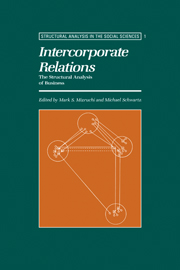Book contents
- Frontmatter
- Contents
- List of figures
- List of tables
- Introduction
- I Theoretical perspectives
- II National and international business structures: a comparative perspective
- 6 The structure of class cohesion: the corporate network and its dual
- 7 Intercorporate structures in Western Europe: a comparative historical analysis
- 8 The articulation of power and business structures: a study of Colombia
- 9 Business–government relations in modern Japan: a Tōdai–Yakkai–Zaikai complex?
- 10 International bank capital and the new liberalism
- Index of authors
- Subject index
10 - International bank capital and the new liberalism
Published online by Cambridge University Press: 04 February 2010
- Frontmatter
- Contents
- List of figures
- List of tables
- Introduction
- I Theoretical perspectives
- II National and international business structures: a comparative perspective
- 6 The structure of class cohesion: the corporate network and its dual
- 7 Intercorporate structures in Western Europe: a comparative historical analysis
- 8 The articulation of power and business structures: a study of Colombia
- 9 Business–government relations in modern Japan: a Tōdai–Yakkai–Zaikai complex?
- 10 International bank capital and the new liberalism
- Index of authors
- Subject index
Summary
Introduction
This chapter deals with recent structural changes in the North Atlantic business system established in the period of American hegemony over Europe. In the era running from the closing stages of World War II to the early seventies, US political leadership, in meeting the global challenge of anticapitalist forces, interacting with its economic primacy, worked to galvanize the states of North America and Western Europe into a single military-political bloc within which the American pattern of capital accumulation, developed in the New Deal and World War II, was extrapolated to the Atlantic level.
This process, which eventually eroded the initial American advantage over its Western European client states in terms of labor productivity, level of concentration and centralization of capital, and financial strength, can be analyzed for our purposes in terms of (1) the development of productive capital in the different component regions and in different industrial sectors; (2) the relation between productive and money capital as expressed in the power balance between industrial and financial firms; and (3) the overall structure of the profit distribution process, comprising several other distributive categories besides the main profit-takers mentioned under (2).
It is our contention that, whereas during the period of American hegemony and the Atlantic extrapolation of the mode of capital accumulation pioneered by the USA, these patterns were still primarily national (with a semblance of internationalism due to overwhelming US superiority), from the seventies on the acceleration of the internationalization of capital and the erosion of the US advantage have combined to create a truly international system, which is no longer an extension of a dominant national economy.
- Type
- Chapter
- Information
- Intercorporate RelationsThe Structural Analysis of Business, pp. 298 - 319Publisher: Cambridge University PressPrint publication year: 1988



